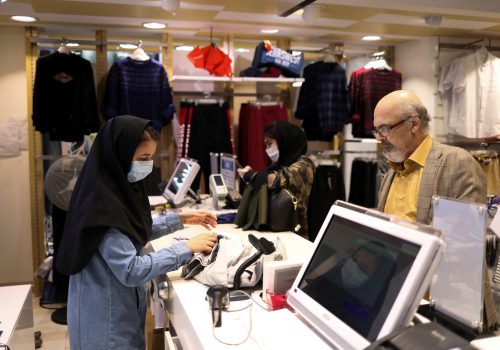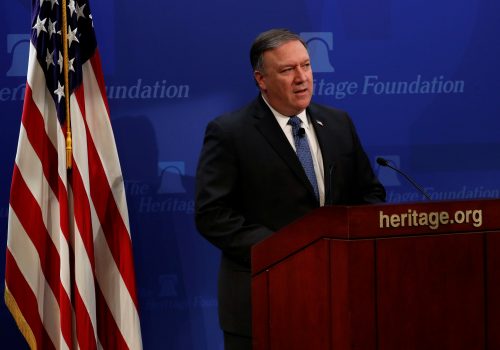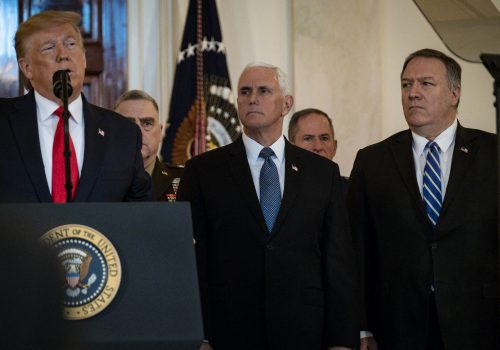The United States needs an Iran strategy, not a ‘campaign’
The United States’ policy towards Iran has reached an impasse. The Trump administration will have gone a full term without a meaningful strategy towards this historic rival. The US is not headed towards resolving the Iran issue in the midst of great power competition. Should President Donald Trump be reelected, there may be more of the same.
While it would seem to be in Iran’s best interests to reengage with the US—to get some sanctions relief and ease its international isolation—Tehran appears to be waiting out the 2020 presidential election. The foreign policy of presumptive Democratic presidential nominee Joe Biden is not yet entirely clear either, but there is at least the prospect of a US return to the Joint Comprehensive Plan of Action (JCPOA).
When President Trump withdrew from the JCPOA in 2018 and implemented a “maximum pressure” campaign, the stated goal was to halt Iran’s malign behavior and encourage Iran to return to negotiations on a new and “better” deal. However, the Trump administration has yet to achieve either goal. Any foreign policy strategy in the Middle East is challenging, but with Iran, in particular, it should be grounded in diplomacy, not coercion. No matter how flawed the JCPOA is, the “maximum pressure” campaign has been even more detrimental to US national interests. Regardless of who occupies the Oval Office in January 2020, US foreign policy should be deeply rooted in diplomatic efforts to restore the international relationships that have been marred by its unilateralist Iran policy.
Publicly, President Trump has stated repeatedly that he would speak with Iran’s leaders, insisting “if they want to meet, I’ll meet.” However, the officials he has put in charge of executing US policy toward Iran have focused more on pressure than outreach. Secretary of State Mike Pompeo has harshly criticized Iran, while Special Representative for Iran, Brian Hook, said in his October 2019 testimony that “We are relying on economic pressure and the might of American diplomacy to raise the costs on Iran and force meaningful behavior change.”
While US sanctions have starved the regime of resources, Iran’s behavior has only gotten worse, especially after the US imposed what amounted to an embargo on the export of Iranian oil in May 2019. One month later, in June 2019, Iran attacked Emirati tankers in the Persian Gulf and shot down a US Navy drone. In July 2019, Iran seized a Panamanian-flagged tanker, blocked others from passing through the Strait of Hormuz, and seized the UK-flagged Stena Impero.
Other attacks came through proxies—most notably Shia militia groups, such as Kataib Hezbollah, that operate across Iraq. Both Hook and Pompeo continue to insist that, despite these provocations, the pressure campaign is working. However, these incidents show that the campaign is failing. Iran has responded with a series of retaliatory actions following the US’ implementation of sanctions and withdrawal from the JCPOA. Resisting US pressure is indicative of Iran’s boldness and a “nothing left to lose” attitude. The most recent Iranian provocation was sending oil tankers to Venezuela, which elicited no US action beyond the threat of yet more sanctions.
After the US assassinated the head of the Quds Force, Major General Qasem Soleimani in January, the Trump administration offered another defense for its campaign. Senior officials argued that it was necessary to deter Iran from continuing its malign activities in the region, which included the actions of its proxies. Indeed, Soleimani was responsible for establishing a number of militia groups to which Iran has supplied resources and training. However, a strike of this magnitude needs to be done at the right place, at the right time, and for the right reasons.
At the same time, the Trump administration maintained that killing Soleimani would act as a deterrent to more bad behavior, all while the US is withdrawing troops from the region. This begs the question of whether the administration still views Iran as a threat. Deterrence requires a robust presence; a withdrawal is antithetical to what the administration claims to be doing toward Iran.
Tehran may not respond in a dramatic way to Soleimani’s death, beyond the missile strikes that gave concussions to scores of Americans on a base in Iraq in January. Iran prefers to keep its adversaries on high alert, short of kinetic action and cornered, thereby restricting freedom of movement. Iran is also building leverage through its nuclear program, having stopped observing limits on its stockpile of low-enriched uranium and centrifuges.
Should Trump be re-elected, he should receive better advice on Iran strategy. Over time, sanctions become less effective and do not advance policy goals. History tells us that economic pressure, alone, usually does not coerce a regime to change behavior. Iran also has a record of successfully circumventing sanctions. Nevertheless, as coronavirus has ravaged Iran with over 208,000 cases and over 9,700 deaths, the US has continued with sanctions. Despite this, Iran is still functioning and not showing any signs of capitulation.
Sound foreign policy relies on expertise and strategic know-how. However, Hook calls Iran a “Marxist theocracy”—a phrase he has used since 2019—which is contradictory given that Marxism and religion are not synergic concepts.
There needs to be a strategy that explains US goals and a clear means of achieving them. Thus far, the US has frustrated its closest allies—Germany, France, and the United Kingdom—and upset even its Arab partners, who have called for restraint since Soleimani’s killing. The international community is not as confident as it once was in the American promise of security. A pivot towards a regional strategy that also has support from Europe would better serve US national interests. Addressing Iran as the center of the Middle East problem could facilitate a better, more constructive response that would generate positive policy outcomes for the region and US interests. Any future dialogue on or with Iran should include Gulf allies, as it is their region. Furthermore, Gulf states should have input not only because we have shared interests, but also because of the US’ focus on great power competition.
While President Trump has consistently said he wants to end endless wars and bring US troops home, the US conflict with Iran complicates that agenda. The US has undercut relationships that could have facilitated policy options that would have better met President Trump’s declared goals. The US president needs better advice and more engaged diplomacy if he really wants to make a new deal with Iran. Otherwise, a potential Biden administration should seek to undo diplomatic losses and restore structure and order in the Middle East.
Alma Keshavarz is a post-doctoral fellow at the Institute for Politics and Strategy at Carnegie Mellon University. She previously served in the Office of Policy Planning at the Department of State where she covered Iran and Iraq.
Image: US Secretary of State Michael R. Pompeo deliver remarks to the media in the press briefing room at the US Department of State in Washington, DC, on June 13, 2019. (State Department photo)


